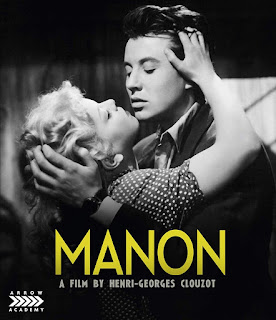Manon
MANON:
The name Henri-Georges Clouzot never jumps to the front of those "best director" lists favored by cineastes. Probably because, as a French director, his work was overlooked and under praised in his own country by the likes of Cahiers du Cinema in favor of British and American genre filmmakers. The international success of Diabolique and The Wages of Fear earned him the nickname of "the French Hitchcock," which only serves to somewhat dismiss his career as an imitator rather than an innovator. But as his lesser-known masterpiece Manon (1949) proves, Clouzot was far more adept and adaptable than his reputation suggests.
Based on the 18th century novel, Clouzot updates the story to post-WW2 Paris where resistance fighter Robert Desgrieux falls for the morally questionable Manon Lescaut. A classic case of country mouse and city mouse, Manon's desperate need for money and excitement clashes with Robert's more delicate family-first sensibilities. And when she turns to a secret life of prostitution (pimped out by her own brother!), a violent reckoning sends the pair on the run as stowaways on a freighter smuggling Jewish refugees. Eventually faced with a death march across an endless desert to freedom, the mismatched lovers discover that love and destiny are often tragically interchangeable.
A historical epic that doesn't lose any detail in its broad strokes, Manon has all the sweeping visual touches of a David Lean film (Lawrence of Arabia) with the painfully personal narrow focus of...well, another David Lean film (Brief Encounter). Yet Clouzot is able to go places other directors are not. His characters' world-view is aggressively pessimistic, full of jealousy, deceit, murder and betrayal. Yet they feed off little flashes of kindness and the hope of a happy ending they really don't deserve. In a Clouzot film rarely does deus ex machina work out in anyone's favor.
And yet there's a brilliance to the dirty realities he smears across the screen; genuineness to all the little brutalities his character commit against each other in the name of love. Not the least of which is a subtle but showy visual style that commands your attention. Clouzot never overshadows his actors a la Hitchcock; his camera only imposes its will when the story dictates. Just watch the amazing dolly sequence through a crowded train that unbelievably follows Manon through a press of sweaty bodies. His films are so uniquely original, no remake can do them justice (although Friedkin's Sorcerer comes close). And Manon deserves a spot at the top of the list.
Arrow Academy's new special edition Blu-ray looks gorgeous from top to bottom. It's miraculous to see a film this rare in this sort of condition. Extras include an archival documentary featuring interviews with Clouzot and his love of literature, plus a video appreciation by film critic Geoff Andrew. An image gallery and reversible artwork complete the package.




Comments
Post a Comment